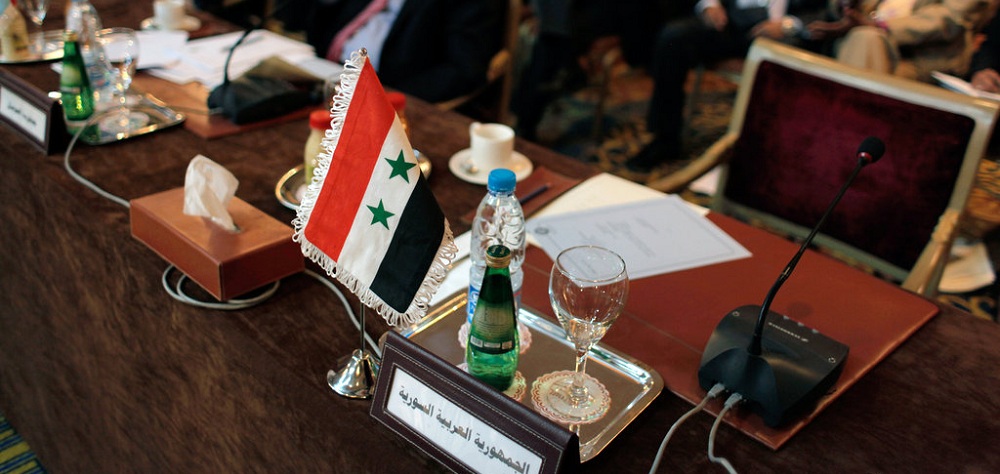Alwaght- While Syria is now a point for global focus amid Damascus campaign to take back Idlib from the foreign-backed terrorists and the Turkish intervention to save the terrorist militias, on Tuesday the government of eastern Libya and the Syrian government agreed to re-establish ties between the two countries as a Libyan delegation, headed by Deputy Prime Minister Abdel Rahim al-Ahayrash and Foreign Minister Abdul Hadi al-Hewaij, representing General Khalifa Haftar has been engaged in several-day talks with the Syrian officials.
At a ceremony, Libya reopened its embassy in Syria. Syrian Deputy Foreign Minister Faisal Miqdad in a speech said that the return of the Libyan flag to Damascus would be a prelude for return of other countries’ flags to the Arab country.
This development is taking place in the Syrian foreign relations while recently the Arab League delayed to the summer a scheduled meeting of the Arab leaders in Algeria under excuse of fears of Coronavirus spread. Informed sources have said that the delay was an outcome of a difference between the Arab countries and Algeria as the latter insisted that Syrian government, which was suspended in the Arab bloc only a few months after eruption of the crisis in 2011, should return to the Arab meetings.
The delay carries three hidden points, analysts point: First, Syria has a clear outlook of the government taking back the terrorist-held territories and stabilizing the conditions. Second, Syria is gaining a geopolitical significance amid rivalry among the key power poles. And third, the Arab world is undergoing unavoidable changes.
Syria, forefront of anti-terror battle
The start of the Syrian crisis in 2011 along with the massive foreign intervention to topple the Syrian government ignited a devastating conflict in the Arab country that saw a spread of terrorism the world has never seen before.
The Arab countries spearheading the Arab anti-Damascus camp – Saudi Arabia, the UAE, and Qatar– which pushed to oust the government of President Bashar al-Assad played a major role in suspension of Syria from the Arab League and forcing other Arab states to cut off diplomatic ties with the Syrian government.
However this anti-Damascus line broke as many Arab countries a few years later understood that aggravated situation in Syria only fuels terrorism which poses common dangers to the whole Arab world. Gradually, the countries figured out the importance of Syria as a forefront of anti-terror fight during which the government paid a high price. So, it can be said that the Arab countries are beginning to improve the ties with Damascus as the Syrian government stabilizes the security conditions after years of fight against terrorist militias. Such countries as Libya, which itself is a victim of terrorism, are backing the Syrian operations against the Turkish and Western-backed terrorist groups.
Syria, a playing card in foiling Turkey’s empire building dreams
The eastern Libya delegation trip to Syria and reopening the embassy in Damascus and also launching efforts by other Arab states to restore Syria seat in the Arab League come while a large-scale proxy confrontation between rival actors is underway in Libya. Arab and Russian-backed General Haftar is leading an assault against the Turkish-backed Government of National Accord (GNA) to wrest the capital Tripoli from the government of Prime Minister Fayez al-Siraj.
Libya, an oil and gas-rich country with geopolitical significance in the Mediterranean coast, has been home to two parallel governments one in the east and one in the west as the war, prompted by fall of the Muammar Gaddafi in 2011 as a result of popular uprising, kept unfolding between militias. The war gave birth to regional and international opposite camps in Libya. Russia, Saudi Arabia, Egypt, and the UAE back General Haftar while on the opposite side Turkey throws its military weight behind the GNA.
The proxy war prompted deployment of mercenaries by Haftar patrons and military forces and Syria war terrorist fighters by Turkey to Libya. In the middle of this situation, Haftar and his backers are growing increasing awareness of the Syrian status as the center of focus of the Turkish regional militaristic policies. They are improving Libyan-Syrian ties as they want to neutralize Erdogan strategy in Syria and at the same time prevent transfer of terrorist fighters from Syria to Libya. Syrian and Libyan officials emphasized joint fight against terrorist groups and foreign intervention.
More to Turkey’s frustration, on Monday Al-Arabi Al-Jadid news website reported that Egypt’s intelligence chief Abbas Kamel is leading an effort to form an Arab coalition to deter the Turkish influence in the Arab world. The Arab-language website added that last week a meeting was held in Cairo with a theme focusing on Turkish intervention in Arab world.
The intelligence meeting ended with recommendations for the Arab leaders: First, Syria suspension should end as immediately as possible and second Damascus should take part in the upcoming Algeria-hosted Arab League summit. The website revealed secret trip by the Egyptian intelligence chief to Algeria, Morocco, and eastern Libya to push for anti-Turkish Arab alliance.
Power equations change gradually in Arab League
Over the past decade, the Arab world underwent essential changes the outcome of which has been upswing of independent voices and at the same time downswing of hegemony of wealthy Persian Gulf Arab powers. Tunisia, Algeria, and Sudan were the countries where despotic regimes close to Saudi Arabia and the UAE fell as a result of two waves of uprisings. In the long run, the scale will turn towards bigger power and role to the independent Arab states which are now along with special role of Iraq and Lebanon, pressing for immediate Syria return to the Arab League.



























